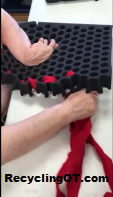I found this thick foam in a storage closet at work and thought --"that would feel nice to use in fine motor activities" I first used it on a table for individuals to insert shakers made out of pill containers. Then I thought of the magnetic pegs and white board in the program room. I tied the foam onto the board and demonstrated how to walk to a table, retrieve a peg and walk to the board for insertion. This is shown in the video...…..
This was beneficial because:
1) this client loves to walk.
2) this client tends to hunch over so reaching up to place the pegs helped her posture
3) she worked on a multistep task which is a bit more interesting and challenging (in my humble opinion)
4)she has poor motor control and these large pegs are easy to push into the deep foam holes.
2) this client tends to hunch over so reaching up to place the pegs helped her posture
3) she worked on a multistep task which is a bit more interesting and challenging (in my humble opinion)
4)she has poor motor control and these large pegs are easy to push into the deep foam holes.
Pulling strips of fabric in and out of the foam is not quite weaving and its not quite lacing. But its very wonderful because - as you know-the foam feels great. In addition, she is wheelchair bound and this is relatively good exercise with all the reaching. But most importantly, the client is doing meaningful occupation. She had a stroke and now has dementia and repeatedly tells me that she used to love quilting.
This is every occupational therapists dream- being able to help her patient to resume a leisure activity that is similar to what she previously was able to do but adapted to much easier and successful.
Also shown in the video is a woman with hemiplegia who is able to use her affected left side to stabilize the foam. I love when my clients STABILIZE!
Notice the clever blue needle adaptation made out of a plastic piece cut from a coffee container. I didn't notice until one of the clients pointed out that the needle had a picture of coffee on it. I just happened to luck out and it smells great. Cut a slit in the "needle" to push the fabric strip through. This makes it easier to grasp and push through the foam holes.
Options: Making the task more cognitive challenging
1) teach specific types of stitches or a design
2) do a color sequence knotting strips of red, white and blue perhaps for a United states flag theme
3) Provide a model with color patterns to copy.
1) teach specific types of stitches or a design
2) do a color sequence knotting strips of red, white and blue perhaps for a United states flag theme
3) Provide a model with color patterns to copy.
If you come up with any more ideas on how to use the foam please share…..
Oh..... and in case you are wondering- I am really fast at cutting fabric strips out of the piles of unwanted tubes and folded cloth retrieved from a Recycling program . Most of it is fleece which gives us really nice tactile touch sensory stimulation which weaving or lacing or whatever......
Oh..... and in case you are wondering- I am really fast at cutting fabric strips out of the piles of unwanted tubes and folded cloth retrieved from a Recycling program . Most of it is fleece which gives us really nice tactile touch sensory stimulation which weaving or lacing or whatever......
FOAM ACTIVITIES FOR INDIVIDUALS WITH DEVELOPMENTAL DISBILITIES













1 comment:
Thanks for sharing, good post ! it Provides a good Occupation thrapy information and also the Best occupational therapy in uae
Post a Comment